Sean Jacobs's Blog, page 542
April 10, 2012
The 19th New York African Film Festival: 'Playing Warriors'
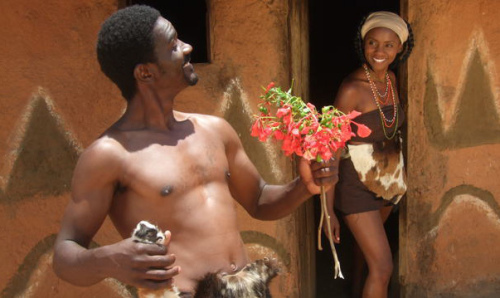
It's not hard to see why Rumbi Katedza's first feature has been described as a Zimbabwean 'Sex and the City'. Four high-flying twenty-something women spend a good chunk of the movie hanging out in trendy Harare bars talking sex, dating, and marriage. There's kissing, laughing, gossiping and some great outfits. Luckily, unlike the HBO series, there's no annoying voiceover offering throwaway insights every five scenes. Katedza's heroine Nyarai (Kudzai Sevenzo) is no Carrie Bradshaw. She's cleverer, sharper, and when it comes to the crunch she is strong enough not to need the affirmation of men to feel good about herself. "Men use tradition when it suits them," she tells her marriage-obsessed mother.
'Playing Warriors' is about young urbanites grappling with a traditional way of life that they can neither understand nor escape, a culture they belong to yet feel more and more distant from. Nyarai has hilarious, Flintstones-esque, daydreams of pre-colonial village life, and protests, "All they want to hear is that we're barefoot, pregnant and married!"
Eight years in the making, Katedza (who is also behind the site ZimbabweFilm.com) has written a warm and witty film. There are tears as well as giggles, but you're never too far away from a snogging couple falling off a bed or a jaw-dropping demonstration of male vanity to lighten things up. If there's a sequel or a series to follow this then the folks at Shuga had better watch out: they've got competition, and it's funny.
'Playing Warriors' plays on Sunday, April 15, at 4pm at the Walter Reade Theater at Lincoln Center.
* Africa is a Country will review films from the 19th New York African Film Festival (April 11-17) over the next few days. Also come to the two panels on "Cinema and Propaganda" which we are co-presenting with the Festival on Saturday, April 14, at the Lincoln Center in Manhattan.

April 9, 2012
The 19th New York African Film Festival: 'How to steal 2 million'
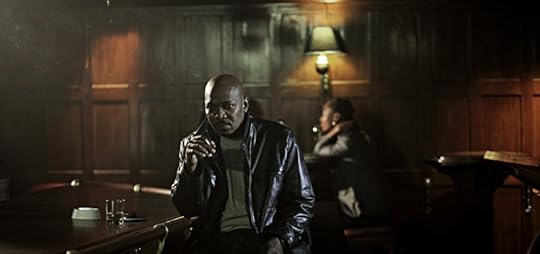
In South African director Charlie Vundla's "How to Steal 2 Million," Johannesburg is equated with "a jungle." In an opening monologue, the main protagonist, middle aged Jack–fresh out of jail and looking for a job and opportunities–compares the city unfavorably to New York City, where, in contrast, people "are in it together." Mostly shot in depressing, dark interiors and at night, the Johannesburg of the film lives up to this characterization. But it's not just the main character who pines for a projected version of New York City; the film itself longs for its double, adapting and mirroring New York's association with film noir.
The film follows the trajectory of Jack (played by Menzi Ngubane) and his last-ditch attempts to rise above petty crime. Jack had some money stashed away in books, but soon he'll run out. An old acquaintance, Twala (Rapulana Seiphemo) entices him to commit a robbery: to steal from Twala's father, played by a Tony Award winner John Kani. The younger Twala needs to pay off gambling debts. There's also lot more than meets the eye in the first scenes. We learn that Twala stole Jack's girlfriend Kim (Hlubi Mboya) while Jack was serving time, and Twala Snr. is himself a first class criminal. Then there's Olive (Terry Pheto of "Tsotsi"), a thief who Jack meets in a bar. He recruits her for the heist. 'How to steal 2 million' joins a slew of other new crime films out of South Africa set in Johannesburg (think "Jerusalema" in which Seiphemo had the lead; that film was led down by its stereotypical portrayal of Nigerians and fanciful plot). Here the focus is more on the characters and the plots they concoct to outsmart each other. Some cliched dialogue aide, in the end the tale holds up well. Fans of gangster movies will definitely appreciate this one.
Here's the trailer:
"How to steal 2 million' plays on Thursday, April 12, at 8.15pm at the Walter Reade Theater at Lincoln Center.
* Africa is a Country will review films from the 19th New York African Film Festival (April 11-17) over the next few days. Also come to the two panels on "Cinema and Propaganda" which we are co-presenting with the Festival on Saturday, April 14, at the Lincoln Center in Manhattan.

Films at the 19th New York African Film Festival: 'How to steal 2 million'

In South African director Charlie Vundla's "How to Steal 2 Million," Johannesburg is equated with "a jungle." In an opening monologue, the main protagonist, middle aged Jack–fresh out of jail and looking for a job and opportunities–compares the city unfavorably to New York City, where, in contrast, people "are in it together." Mostly shot in depressing, dark interiors and at night, the Johannesburg of the film lives up to this characterization. But it's not just the main character who pines for a projected version of New York City; the film itself longs for its double, adapting and mirroring New York's association with film noir.
The film follows the trajectory of Jack (played by Menzi Ngubane) and his last-ditch attempts to rise above petty crime. Jack had some money stashed away in books, but soon he'll run out. An old acquaintance, Twala (Rapulana Seiphemo) entices him to commit a robbery: to steal from Twala's father, played by a Tony Award winner John Kani. The younger Twala needs to pay off gambling debts. There's also lot more than meets the eye in the first scenes. We learn that Twala stole Jack's girlfriend Kim (Hlubi Mboya) while Jack was serving time, and Twala Snr. is himself a first class criminal. Then there's Olive (Terry Pheto of "Tsotsi"), a thief who Jack meets in a bar. He recruits her for the heist. 'How to steal 2 million' joins a slew of other new crime films out of South Africa set in Johannesburg (think "Jerusalema" in which Seiphemo had the lead; that film was led down by its stereotypical portrayal of Nigerians and fanciful plot). Here the focus is more on the characters and the plots they concoct to outsmart each other. Some cliched dialogue aide, in the end the tale holds up well. Fans of gangster movies will definitely appreciate this one.
Here's the trailer:
"How to steal 2 million' plays on Thursday, April 12, at 8.15pm at the Walter Reade Theater at Lincoln Center.
* Africa is a Country will review films from the 19th New York African Film Festival (April 11-17) over the next few days. Also come to the two panels on "Cinema and Propaganda" which we are co-presenting with the Festival on Saturday, April 14, at the Lincoln Center in Manhattan.

Joyce Banda is President of Malawi

In her first order of business since being inaugurated as Malawi's new president on Saturday, Joyce Banda fired the country's top policeman. No reason was given for the firing, but the BBC reports that the police chief, Peter Mukhito, was in charge last year during anti-government protests over the worsening economy. Mukhito had personally questioned a University of Malawi lecturer over comparisons the latter had made between the uprisings in Tunisia and Egypt and the fuel crisis in Malawi. The university was later closed. Then last July, police shot dead 19 protesters. Banda's decisiveness does not surprise long term observers of Malawian politics and her appointment carries wider significance beyond the Southern African country.
For Malawians, it means a "triumph for democracy" in that the proper succession has occurred peacefully and smoothly. Given the rumors and some public statements after the sudden death of Banda's predecesor, Bingu wa Mutharika, this is especially welcome news. So much for the Afro-pessimists. Senegal in March, Malawi in April. The Malian coup lasted only a few days. Who knows what May will bring?
Joyce Banda was the first woman Vice-President of Malawi. She is now the first woman President of Malawi and the first woman President in Southern Africa.
Banda has been a lifelong champion of women's rights. She has spent decades organizing rural women, in Malawi and beyond. She has pushed and pulled women, and pushed and pulled with women, to demand equal access to education, to jobs, to land, to health services, to opportunities, to power. She has started women's organizations and actively supported women's movements.
In 2004, Banda entered government as Minister of Gender, Child Welfare and Community Services. She focused, both in legislative and delivery terms, on addressing domestic violence. She then moved on to become Minister of Foreign Affairs in 2006 and Vice-President in 2009.
In recent years, as the regime of Mutharika became increasingly repressive and autocratic, Banda remained an independent voice for women and for others who suffered systemic and structural disenfranchisement, in good times and in bad. When Banda was kicked out of the ruling Democratic Progressive Party, she formed her own, the People's Party, and stayed in office.
And there she has been. Speaking out for women when they were attacked by vendors in Lilongwe and Blantyre earlier this year. Speaking out for rural women constantly. Speaking out for more inclusive and democratic processes at all levels of state.
Joyce Banda has spent her life paying attention, learning, engaging, organizing, and effecting positive change. In particular, she watched and learned the difficulties and inequities of rural women's and girls' lives.
As a child, she learned that inequality intensifies with rural girls' exclusions from school, and that the ways of those exclusions are numerous, entwined, complex, and structural.
At 21, Banda married and gave birth to three children. Her husband was abusive; the marriage was corrosive. Banda took her three children, left, and then got a divorce. For the next forty years, she has worked to end domestic violence and transform women's positions in the world and at home.
When Banda gave birth to her fourth child, she suffered from post partum hemorrhaging and almost died. She realized she owed her life to easy access to trained medical care. From there, she began organizing and working for better access, especially among rural women, to reproductive health care and health care generally.
Joyce Banda's ascendancy to the Presidency of Malawi is a moment to celebrate, to acknowledge, to hail. Women know, "The future starts now!"

The 19th New York African Film Festival: 'Restless City'*
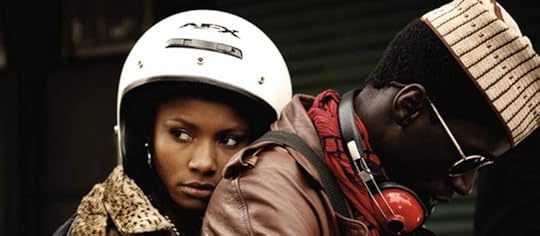
Towards the final scenes of Restless City, Jessye Norman's solo soprano voice scales the great buildings and the conveyor belts of vehicles, between all of which a small red scooter navigates, carrying the slim bodies of Djibril and Trina. They are here, in this city, with all their desires clenched in their mouths. It is Norman's voice, following the music composed by Richard Strauss to the poetry of Herman Hesse, that lifts our two immigrants' desires up on the currents of her song, skylarks freed into the night sky.
While director Andrew Dosunmu's story follows a storyline that might seem expected, narrating a tale about immigrants hustling the streets of the big city, a young boy with dreams of making it big on the American music scene, a pinup beauty lured into prostitution, a jolie-laide pimp/moneylender (made almost comically sophisticated by his loyalty to Mobutu hats), and a good woman who almost turns everything around with her stoic, seen-it-all stance, you'd be mistaken if you took this film to follow a well-worn cliché.
Instead of the usual narration-heavy didacticism of the morality tale, Djibril and Trini's journeys in the city, as both attempt to make their entry, is conveyed with minimal dialogue; writer Eugene Gussenhoven is spare with his words, permitting, instead, for impressionistic scenes built on costume, light, and movement to suggest the impossibility of realising the most minor of desires, or using a small gesture with the hands to convey all of Djibril's prayers for mobility before he sets out on his scooter, in defiance of the M1 via Madison bus chasing at his heels. When Djibril cradles the red domes of his ever-present headphones, we know that they are more than conveyors of music: they are a talisman, shielding him from the rigours of loving and living in this city.
Every immigrant remembers how the fragrance of their dreams called to them, and how our limbs trembled at the siren song. In this city of great expectations, the song of the angel Djibril are revelations that most will find difficult to hear, interrupting the call of the city's sirens.
"Restless City" plays Saturday, April 14, at 9.30 at the Walter Reade Theater at Lincoln Center.
* Africa is a Country will review films from the 19th New York African Film Festival (April 11-17) over the next few days. This is the first of the reviews. Also come to the two panels on "Cinema and Propaganda" which we are co-presenting with the Festival on Saturday, April 14, at the Lincoln Center in Manhattan.

Films at the 19th New York African Film Festival: 'Restless City'*

Towards the final scenes of Restless City, Jessye Norman's solo soprano voice scales the great buildings and the conveyor belts of vehicles, between all of which a small red scooter navigates, carrying the slim bodies of Djibril and Trina. They are here, in this city, with all their desires clenched in their mouths. It is Norman's voice, following the music composed by Richard Strauss to the poetry of Herman Hesse, that lifts our two immigrants' desires up on the currents of her song, skylarks freed into the night sky.
While director Andrew Dosunmu's story follows a storyline that might seem expected, narrating a tale about immigrants hustling the streets of the big city, a young boy with dreams of making it big on the American music scene, a pinup beauty lured into prostitution, a jolie-laide pimp/moneylender (made almost comically sophisticated by his loyalty to Mobutu hats), and a good woman who almost turns everything around with her stoic, seen-it-all stance, you'd be mistaken if you took this film to follow a well-worn cliché.
Instead of the usual narration-heavy didacticism of the morality tale, Djibril and Trini's journeys in the city, as both attempt to make their entry, is conveyed with minimal dialogue; writer Eugene Gussenhoven is spare with his words, permitting, instead, for impressionistic scenes built on costume, light, and movement to suggest the impossibility of realising the most minor of desires, or using a small gesture with the hands to convey all of Djibril's prayers for mobility before he sets out on his scooter, in defiance of the M1 via Madison bus chasing at his heels. When Djibril cradles the red domes of his ever-present headphones, we know that they are more than conveyors of music: they are a talisman, shielding him from the rigours of loving and living in this city.
Every immigrant remembers how the fragrance of their dreams called to them, and how our limbs trembled at the siren song. In this city of great expectations, the song of the angel Djibril are revelations that most will find difficult to hear, interrupting the call of the city's sirens.
"Restless City" plays Saturday, April 14, at 9.30 at the Walter Reade Theater at Lincoln Center.
* Africa is a Country will review films from the 19th New York African Film Festival (April 11-17) over the next few days. This is the first of the reviews. Also come to the two panels on "Cinema and Propaganda" which we are co-presenting with the Festival on Saturday, April 14, at the Lincoln Center in Manhattan.

April 7, 2012
Walking on water
From the Otelo Burning soundtrack (we still owe the soundtrack a review), here's'Walk on Water' by Reason. The film about a group of young South African surfers, set in 1989, comes with an official mixtape.








April 6, 2012
The World of Congolese artist Pume Bylex
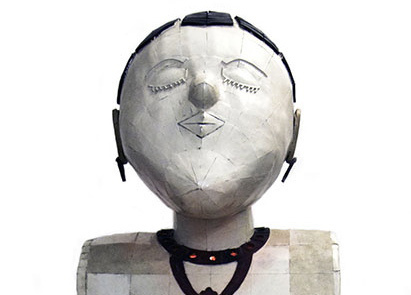
In the introduction to The World According to Bylex Filip De Boeck and Koen Van Synghel describe the Congolese artist Pume Bylex as "not interested in the day-to-day reality of Kinshasa. [He] turns his attention to what lies beyond the horizon of the visible and the tangible (…) a world with perfection and harmony at its centre." Pume Bylex is showing new work at the Halle de la Gombe (Kinshasa) until April 28 and from May 23 to July 21 at the Revue Noire gallery (Paris).








The racial politics of Tuareg nationalism
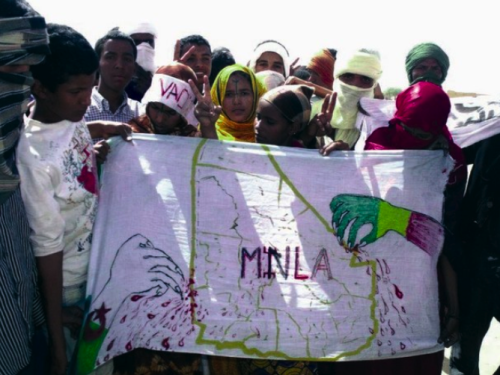
Like good nomads ought to be, Tuareg desert blues super group Tinariwen are on tour. I hear good things about them as individuals, and I'm sure they're all fine human beings, but I'm not a big fan. The music is alright, but the politics is rancid. Here's why.
"Our music was created under the same circumstances as the American blues," Eyadou Ag Leche tells Belgian TV. "We've been colonized." He seems to want a Tuareg state in the Malian Sahara, something like the state of Azawad that declared its independence from Mali on Friday.
Whatever Tinariwen's singing, it ain't the blues. It's the white man's blues. In the 1950s, many people in the southern Sahara, mostly Tuareg, did not want to be ruled by Blacks (sound familiar?). The racial divide was an old one, but the French colonizers had nurtured it, even doped it up just before independence. They promised to create a separate Saharan territory expressly for the Tuareg, one that would stay under French rule. When independence came in 1960, and much of the Sahara became Malian territory, many Tuareg considered this a betrayal — the 'other' Whites had left them to be ruled by the Blacks. Some have been in revolt, on and off, ever since. This history isn't pretty, and the racism cuts both ways. The extreme violence with which Mali put down a Tuareg revolt in the early '60s didn't help. They might have killed a lot of people, but they didn't kill the dream. Today's claims for an independent 'Azawad' are based on an old racial rhetoric and a newer nationalist veneer.
So whose blues are Tinariwen singing? I'm from the South — not the global one, the American one. If Lynyrd Skynryd sang this same song ("Sweet Home, Azawad"?), you and I would call bullshit on that, too.








The racial politics of Mali's Tuareg

Like good nomads ought to be, Tuareg desert blues super group Tinariwen are on tour. I hear good things about them as individuals, and I'm sure they're all fine human beings, but I'm not a big fan. The music is alright, but the politics is rancid. Here's why.
"Our music was created under the same circumstances as the American blues," Eyadou Ag Leche tells Belgian TV. "We've been colonized." He seems to want a Tuareg state in the Malian Sahara, something like the state of Azawad that declared its independence from Mali on Friday.
Whatever Tinariwen's singing, it ain't the blues. It's the white man's blues. In the 1950s, many people in the southern Sahara, mostly Tuareg, did not want to be ruled by Blacks (sound familiar?). The racial divide was an old one, but the French colonizers had nurtured it, even doped it up just before independence. They promised to create a separate Saharan territory expressly for the Tuareg, one that would stay under French rule. When independence came in 1960, and much of the Sahara became Malian territory, many Tuareg considered this a betrayal — the 'other' Whites had left them to be ruled by the Blacks. Some have been in revolt, on and off, ever since. This history isn't pretty, and the racism cuts both ways. The extreme violence with which Mali put down a Tuareg revolt in the early '60s didn't help. They might have killed a lot of people, but they didn't kill the dream. Today's claims for an independent 'Azawad' are based on an old racial rhetoric and a newer nationalist veneer.
So whose blues are Tinariwen singing? I'm from the South — not the global one, the American one. If Lynyrd Skynryd sang this same song ("Sweet Home, Azawad"?), you and I would call bullshit on that, too.








Sean Jacobs's Blog
- Sean Jacobs's profile
- 4 followers




